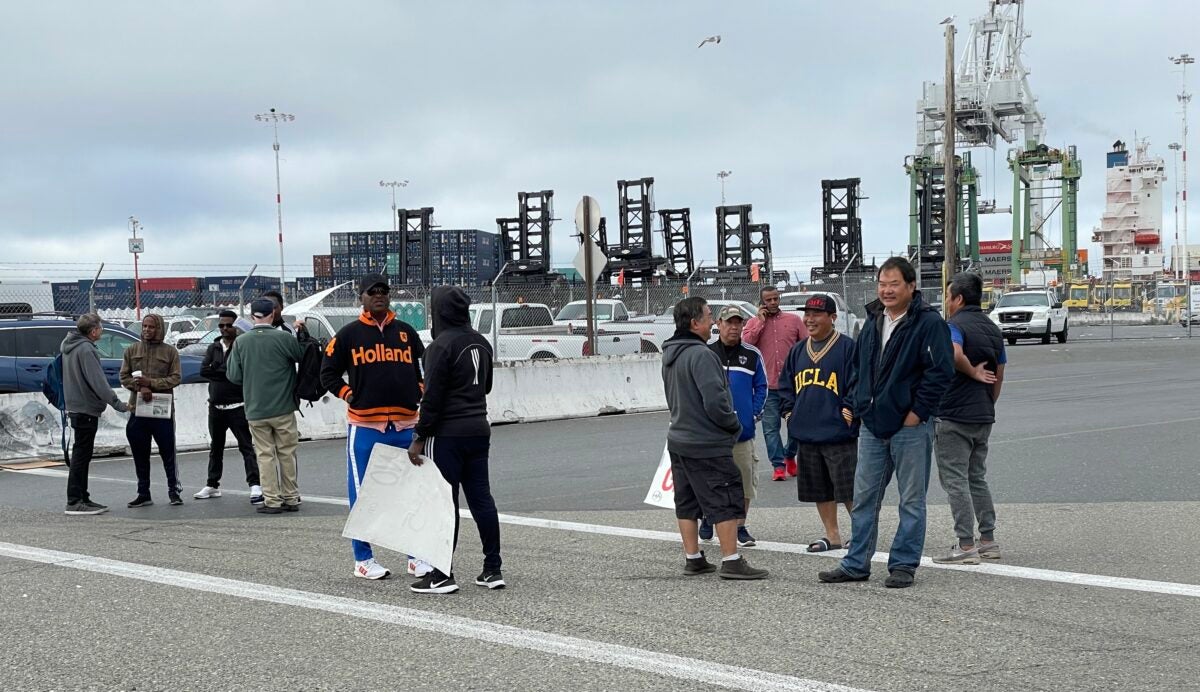OAKLAND, Calif. — Approximately 100 members of the International Longshore and Warehouse Union Local 10 refused to cross the protest line Tuesday as owner-operators blocked the gates of the SSA terminal, which is the largest operator at the Port of Oakland, in opposition of California’s controversial independent contractor law, AB5.
Nearly 1,000 owner-operators, who showed up early Tuesday, also blocked access to the TraPac and Everport terminals, basically shutting down most of the container movement at the port.
Read More: Hundreds of truckers block Oakland terminal access to protest AB5
FreightWaves interviewed some longshoremen who refused to work Tuesday, saying they stand with the truckers.
“We are working without a contract right now so we support the owner-operators and understand what they are trying to do,” said George, a nine-year ILWU member.
Another longshoreman said he isn’t sure whether the dockworkers will work Wednesday either as protesters say they plan to continue the fight against AB5 for “as long as it takes.”
“We stand for it,” Mark, who declined to give his last name, told FreightWaves as he headed to his car.
After a slow start early Monday, the protest has grown to nearly 1,000 owner-operators as more become aware of the potential impact AB5 could have on their trucking businesses.
Gurlal Dhillon has worked in the logistics industry for more than 26 years, with the last six years as a drayage driver serving the Port of Oakland.
He started messaging port drivers Monday about the importance of protesting AB5. The group has grown to over 900 members, with many turning out to show their support Tuesday.
“This is an important issue for California owner-operators,” Dhillon told FreightWaves. “Many thought they would be exempt from AB5, but now they realize the impact.”
Oakland protesters, who own their own rigs and currently choose which loads they want to take, don’t want to work as company drivers as many would be forced to do under AB5.
Ongoing legal challenges prevented AB5 from going into effect in January 2020. The law stems from the California Supreme Court’s decision against Dynamex Operations West Inc., a package and document delivery company. The court found that Dynamex had misclassified its delivery drivers as independent contractors rather than employees and that all California-based companies that use independent contractors must follow the “ABC test,” a three-pronged determination whether a worker is an employee.
The B prong defines an independent contractor as a worker who is engaged in “work that is outside the usual course of the hiring entity’s business.” That is problematic for motor carriers utilizing independent owner-operators to move freight.

Some owner-operators said they initially planned to protest Monday and then go back to trucking. However, they decided to demonstrate for another two days after the Port of Oakland “downplayed the impact” of the protest, which shut down all of the terminals Monday and evening shifts were canceled.
On Monday, Robert Bernardo, director of communications for the Port of Oakland, said port officials were closely monitoring the situation. However, he disputed estimates by those on the front line Monday that the number of protesters was between 300 and 400 owner-operators. Bernardo put the number at 100 to 130 truckers.
“There is some traffic congestion at both TraPac and SSA terminals, so we are working closely with our maritime stakeholders to ensure a safe and continued flow of commerce,” Bernardo said via email to FreightWaves.
This is a developing story.










